|
|
|
Sort Order |
|
|
|
Items / Page
|
|
|
|
|
|
|
| Srl | Item |
| 1 |
ID:
157743
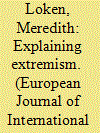

|
|
|
|
|
| Summary/Abstract |
Women participate extensively in armed, Islamist struggle. In recent years, foreign women have travelled from the West to join Daesh. Their participation perplexes policymakers, government officials, and researchers who call attention to the group’s gendered regulation, violence, and widespread use of rape. Consequently, observers often argue that women are deceived by the organisation or seduced by the promise of romance. This suggests that women would not, under rational circumstances, choose to join the group. In this article, we address two resultant questions: why do Western women join Daesh? Are their motivations distinct from other Islamist recruits? Using an original dataset of social media activity from 17 Western female recruits between 2011–15, we conclude that women are primarily driven by religious ideology that adopts an expressly gendered frame. We find that feelings of isolation and disaffection also drive migration. We suggest that female foreign recruits are not unique in their motivations and share many similarities with male fighters and women in other Islamist organisations. This research has valuable implications for security studies and counterterrorism, which tend to treat extremist women as unique. Female recruits should be taken seriously as insurgents intent on establishing an Islamic caliphate.
|
|
|
|
|
|
|
|
|
|
|
|
|
|
|
|
| 2 |
ID:
157740
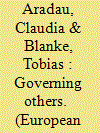

|
|
|
|
|
| Summary/Abstract |
As digital technologies and algorithmic rationalities have increasingly reconfigured security practices, critical scholars have drawn attention to their performative effects on the temporality of law, notions of rights, and understandings of subjectivity. This article proposes to explore how the ‘other’ is made knowable in massive amounts of data and how the boundary between self and other is drawn algorithmically. It argues that algorithmic security practices and Big Data technologies have transformed self/other relations. Rather than the enemy or the risky abnormal, the ‘other’ is algorithmically produced as anomaly. Although anomaly has often been used interchangeably with abnormality and pathology, a brief genealogical reading of the concept shows that it works as a supplementary term, which reconfigures the dichotomies of normality/abnormality, friend/enemy, and identity/difference. By engaging with key practices of anomaly detection by intelligence and security agencies, the article analyses the materialisation of anomalies as specific spatial ‘dots’, temporal ‘spikes’, and topological ‘nodes’. We argue that anomaly is not simply indicative of more heterogeneous modes of othering in times of Big Data, but represents a mutation in the logics of security that challenge our extant analytical and critical vocabularies.
|
|
|
|
|
|
|
|
|
|
|
|
|
|
|
|
| 3 |
ID:
157746
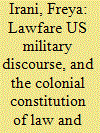

|
|
|
|
|
| Summary/Abstract |
In this article, I aim to reorient debates, in International Relations and Law, about the relationship between law and war. In the last decade, writers have challenged common understandings of law as a limit on, or moderator of, warfare. They have instead claimed that law is often used as a ‘weapon of warfare’, describing such uses as ‘lawfare’. Below, rather than arguing that law is either a constraint on or an enabler of warfare, I examine how law comes to be represented as such. Specifically, I examine representations, primarily by US military and other governmental lawyers, of ‘non-Western’ invocations of the laws of war, which seek to constrain the policies or practices of the US or Israeli governments. I show how these authors cast such invocations as not law at all, but as tools of war. I suggest that this move rests on, and reproduces, colonial discourses of ‘non-Western’ legal inadequacy or excess, which serve to render ‘non-Western’ law ‘violent’ or ‘war-like’. I show that the referents and boundaries of law and war are stabilised by notions of civilisational difference, which serve to give meaning to what law is, what war is, and whether particular claims or practices are understood as martial or legal.
|
|
|
|
|
|
|
|
|
|
|
|
|
|
|
|
| 4 |
ID:
157745
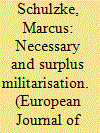

|
|
|
|
|
| Summary/Abstract |
Recent scholarship on militarisation suggests that Western democracies are threatened by military influence spreading into civilian domains. I contend that this research has identified problematic forms of militarisation, but that more careful attention should be given to different manifestations of this phenomenon. I borrow Herbert Marcuse’s distinction between necessary and surplus repression to show that militarisation can be excusable or excessive, depending on the context and its extent. Militarisation is potentially harmful and should be opposed when it is coercive or promotes militarism. By contrast, militarisation may be necessary if it is beneficial or ineliminable. A degree of militarisation may be desirable insofar as contact between civilians and soldiers promotes the spread of information, ensures that civilians have some influence on the military, and prevents members of the military from feeling detached and resentful. Some militarisation may also be indispensable for guarding against plausible threats or promoting social stability. Thus, militarisation should be treated as a process that has mixed costs and benefits depending on how it is enacted.
|
|
|
|
|
|
|
|
|
|
|
|
|
|
|
|
| 5 |
ID:
157741
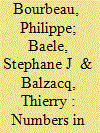

|
|
|
|
|
| Summary/Abstract |
The use of numbers has been remarkably effective at pressing global claims. While research has documented the historical processes through which numbers gained such prominence, and has examined the political and ethical consequences of this omnipresence, very little is known regarding the specific ways in which numbers create the outcomes that sustain governance. This article proposes to close that gap. Building on the literature that acknowledges that numbers not only describe things but also have profound impacts on things themselves, this article offers an integrated account of the working dynamics of numbers in the governance of security. To do so, the article identifies three distinct but connected vectors of power through which numbers shape security governance: persuasion, (de)politicisation, and standardisation. These insights are exemplified through the prism of different empirical examples, the variety of which aims to display the advantages of the approach we propose.
|
|
|
|
|
|
|
|
|
|
|
|
|
|
|
|
| 6 |
ID:
157744


|
|
|
|
|
| Summary/Abstract |
Starting in 2010, the Obama administration engaged in an effort to justify drone strikes relying on the concept of ‘imminence’. The aim of this article is to understand the reasons behind such insistence and to assess the administration’s efforts at conceptual change. Building on Skinner’s and Bentley’s work, the article argues that the administration has followed an ‘innovating ideologist’ strategy. The analysis shows how waves of criticisms exposed the administration to a key contradiction between its rhetoric of change that emphasised international law and the need for aggressive counterterrorism. Reacting to this criticism, the administration has relied on imminence due to its connection with legitimate uses of force, while working to change the criteria for the concept, causing a shift away from imminent as ‘immediate.’ Reassessing Skinner’s place in IR, the article identifies conceptual change as a lens to assess foreign policy rhetoric and practice. The analysis emphasises the connection between actors’ intentions, beliefs, and practices. It highlights the importance of criticism in engendering contradictions, exploring why only some criticisms are confronted. Finally, the article develops an original typology of the limits confronted by the innovating ideologist and methods to assess whether the actor has respected them.
|
|
|
|
|
|
|
|
|
|
|
|
|
|
|
|
| 7 |
ID:
161273


|
|
|
|
|
| Summary/Abstract |
Our primary aim in this article is to explore vernacular constructions of Europe’s so-called ‘migration crisis’ from the grounded everyday perspectives of EU citizens. We do so as a critical counterpoint to dominant elite scripts of the crisis, which are often reliant upon securitised representations of public opinion as being overwhelmingly hostile to migrants and refugees and straightforwardly in favour of tougher deterrent border security. In addition to broadening the range of issues analysed in vernacular security studies, the article seeks to make three principal contributions. Theoretically, we argue for an approach to the study of citizens’ views and experiences of migration and border security that is sensitive to the performative effects of research methods and the circular logic between securitising modes of knowledge production and policy justification. Methodologically, we outline and apply an alternative approach in response to these dynamics, drawing on the potential of critical focus groups and a desecuritising ethos. Empirically, we identify a vernacular theory of ‘the border’ as information management, and a significant information gap prevalent among participants with otherwise opposing views towards migration. These findings challenge bifurcated understandings of public opinion towards migration into Europe and point to the existence of vernacular border security imaginaries beyond either ‘closed’ or ‘open’ borders.
|
|
|
|
|
|
|
|
|
|
|
|
|
|
|
|
|
|
|
|
|